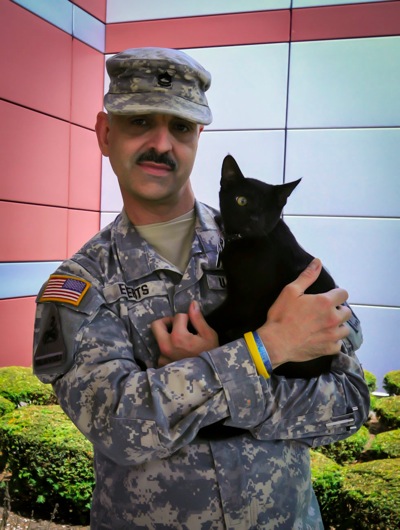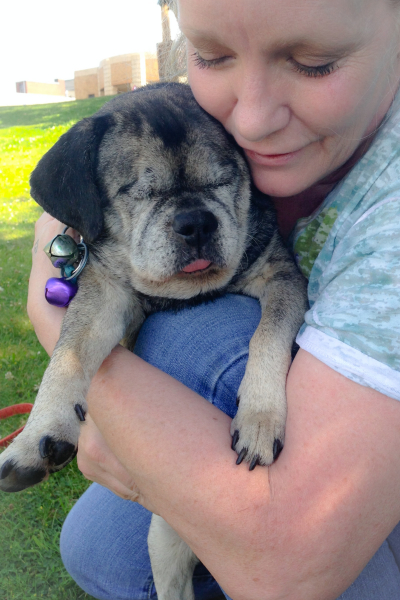Special needs pets are among the most challenging for shelters and rescue groups to adopt out, and many never find a loving home. Yet your perfect companion might just have her own pair of wheels to get around, or rely on visual commands instead of verbal ones.
Three legs, one eye and limitless love
In a survey conducted by Petfinder, it was found that these dogs and cats often wait four times longer than average to be adopted – a long time spent without a family, security and unconditional love, and all due to reasons beyond the animal’s control.
These dogs and cats are overlooked because of their age, medical needs or behavioral issues – including animals who were victims of abuse or illegal fighting rings – even though a missing leg, blindness, insulin-dependence or emotional scars make them no less loving or lovable. Special need pets still have love and devotion to give, and they can adapt to their new homes and lifestyles better than you might think.
At the heart of Pets for Patriots’ mission is giving these animals a second chance at the life they deserve which, for some, may be their last chance. A special needs dog or cat can be no different in most respects than any other pet, though adopting one is potentially more rewarding. After all, you are doing something many others will not: welcoming an animal into your family who asks for nothing in return except for a little extra tender loving care.
Special needs pets are often overlooked because potential adopters do not know what their conditions entail. They may have legitimate concerns about extra medical or training costs, or unfounded biases against a pet that they perceive is less than “perfect.” Yet such impressions or misinformation can be easily overcome through research, speaking with shelter staff who are familiar with the animal, visiting reputable online communities, and consulting a veterinarian to better understand the pet’s actual needs.
What is a special needs pet?
“Special needs pet” is a broad term without a universal meaning.
It generally includes a range of physical disabilities, chronic medical conditions or behavioral issues that require ongoing vigilance or special care to manage. It can include animals with obvious physical distinctions, such as missing, deformed or paralyzed limbs – or those with functional limitations, such as animals who are blind or deaf. Those with chronic medical conditions are often considered special needs as well, such as dogs and cats with diabetes, chronic allergies and cancer. Still others may have social or behavioral limitations, including severe separation anxiety or extreme situational fears. Previously abused animals may fall into this category.
Behavioral issues are often managed through consistent and positive training, while some animals with physical limitations can adapt surprisingly fast to their circumstances. A three-legged dog will still run and play, while a blind or deaf pet will learn to rely on other senses to navigate his home and interact with human family members.
A special needs dog or cat is a dog or cat first
Special needs pets are not defined by their circumstances, and are not aware of how they may be different from other animals of their kind. They are first and foremost a dog or cat – a message often lost on potential adopters.
Although often requiring some type of dedicated care or training, most special needs pets are otherwise just like any other. For example, a blind animal relies on its other senses – hearing and smell – to learn about and navigate its environment. A dog or cat who lose key senses with age, such as sight, often show no signs of a disability until his pet parent rearranges the furniture and the animal becomes seemingly lost in his own home.
Just adopt and add love
A critical responsibility of pet parenthood is providing the care companion pets need throughout their entire lives. They deserve the same loyalty that they give so wholeheartedly to you, and the best thing you can do beyond opening your heart and home to them is providing regular veterinary care.
Prior to and immediately after adopting a special needs pet, meet with your veterinarian to learn about the type of care that will be required at various stages of the animal’s life. Knowledge and preparedness will make for a happy and enriched lifetime with your pet, and will help minimize surprises so that you can be prepared for anticipated changes in your pet’s condition.
While you may not be ready to add a special needs dog or cat to your family, there are other ways to support these amazing animals. Animal welfare organizations often have sponsorship programs to defray the costs associated with providing extra medical care or training that these pets require.
Regardless of how a dog or cat became a special needs pet – by dint of birth, illness, accident, the aging process or at the hands of an abuser – they have much to teach us about resilience and love without judgment.














We have a special needs blind puppy. We are not handicapped but I would like to know if i can certify puppy so that we may take him around like a service dog because left at home he gets nervous and gets anxiety. According to my in laws that live upstairs he will keep barking and running in circles and banging into things. When we do bring him along, he sits calmly and doesn”t make a sound. Please help.
Hi Gramma Sue,
There is no certification for service animals, but if you do not have a qualifying physical or mental disability you cannot legitimately have a service animal. Further, by definition a blind dog cannot be a service animal.
We suggest that you work with your dog’s veterinarian to address his separation anxiety and improve his quality of life.
PETS FOR PATRIOTS
I have a special needs dog,do I need to renew his license every year ?
Hi Carol,
Special needs animals are subject to the same licensing requirements as any other. Please check with your local animal control, which may be your local police department or humane society, for your city’s licensing requirements.
PETS FOR PATRIOTS
Hello –
I am a foster for a rescue with a diabetic pug. She is 100% healthy and awesome aside from having diabetes, which we have recently gotten under control VERY well. I was looking for resources to spread the word about her and hopefully find her a forever family. Any resources or advice would be greatly appreciated!
Hi Anne,
Thanks for being a foster to this special needs pup!
Because we’re not a rescue, we tend not to have the resources at hand to suggest how to go about promoting this wonderful dog. For starters, however, we suggest researching various Facebook, Instagram and G+ groups for anything related to special needs pets. You may want to look for pug-based groups/pages as well.
Hope this helps!
Pets for Patriots
I was looking for a blog where people share their experiences with dealing with an animal with special needs. I have a dog who is 15 1/2 years old with diabetes, she is also deaf, blind, and has dementia. Some days are good, others I feel like I just can’t do it anymore. It is very frustrating because I know she can’t help it, and I feel bad when I get angry at her. Is there anyone out there who has a similar experience?
Hi Teresa,
We understand that it can be occasionally frustrating living with a special needs pet. While we’re not aware of a blog or other online community for guardians of these wonderful animals, you may want to ask your veterinarian if s/he is aware of resources to help you cope with your feelings.
Pets for Patriots
Kathryn and Pepper really speak to me – I would love to know their story…I tried searching and couldn’t find anything.